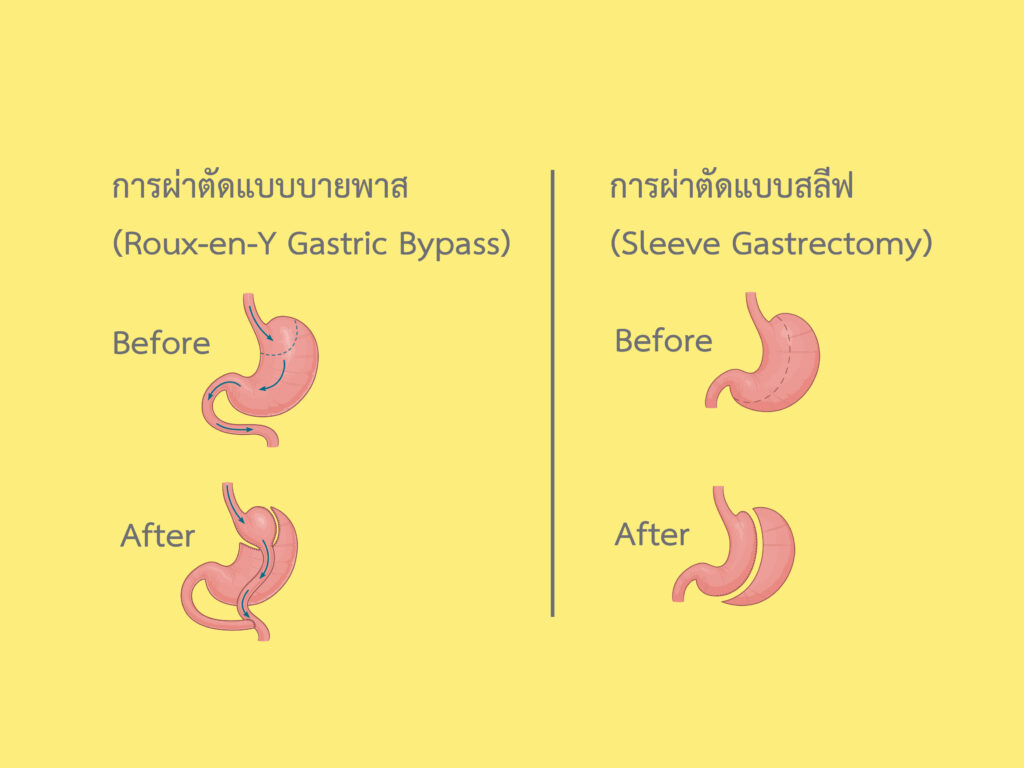Surgical reduction of the stomach size to reduce weight and treat obesity
Author
เรียบเรียงโดย ผศ.นพ.วรบุตร ทวีรุจจนะ ศัลยแพทย์ชำนาญการผ่าตัดด้วยหุ่นยนต์ช่วยผ่าตัด
Date 24.02.2023

When is obesity diagnosed? The most commonly used method to assess obesity is by measuring the Body Mass Index (BMI: kg/m2), calculated by dividing weight (kg) by height squared (m2). If the BMI is greater than 30 kg/m2 (for Westerners) or BMI is greater than 25 kg/m2 (for Asians), it is considered obesity.
How can obesity be treated? Generally, obesity treatment begins with proper diet control, regular exercise, and weight-loss medications under the supervision of a specialized physician. If initial attempts to lose weight through these methods are unsuccessful, bariatric surgery, which involves reducing the size of the stomach, is a good option, especially for individuals with specific indications, such as:
- Patients with BMI > 37.5 kg/m2 without any comorbidities
- Patients with BMI > 32.5 kg/m2 along with comorbidities such as heart disease, high blood pressure, high cholesterol, sleep apnea, type 2 diabetes, stroke, knee osteoarthritis, ovarian cysts, and infertility.
What is Bariatric Surgery? Currently, there are two commonly performed procedures for reducing stomach size:
1. Sleeve Gastrectomy
2. Roux-en-Y Gastric Bypass
Sleeve Gastrectomy: This procedure involves removing a portion of the stomach, leaving it shaped like a sleeve or a banana. The remaining stomach has a volume of approximately 100-200 cc. This surgery reduces food intake and leads to a quicker feeling of fullness. Additionally, it decreases appetite after the surgery. Through various mechanisms, weight loss is achieved in the long term.
Roux-en-Y Gastric Bypass: This procedure involves reducing the size of the stomach (approximately 30-50 cc) and altering the digestive pathway to reduce nutrient absorption. The weight loss mechanisms are similar to those of Sleeve Gastrectomy.
How is Bariatric Surgery performed?
The surgery is performed under general anesthesia, and the patient remains unconscious during the procedure. It is conducted using a minimally invasive approach with small incisions (Minimally Invasive Surgery: MIS). The advantages of MIS include reduced postoperative pain, faster recovery, fewer complications, shorter hospital stays, and an earlier return to work. The surgery typically takes around 1-2 hours, and the patient may stay in the hospital for approximately 2 nights before being discharged.
Why is robotic assistance used in Bariatric Surgery?
Although Laparoscopic Approach is the preferred method for minimally invasive surgery, it has limitations. For example, in patients with severe obesity or a thick abdominal wall, the surgery may take longer, and the surgeon may experience fatigue. Laparoscopic surgery requires advanced skills to perform. Due to these limitations, robotic surgery was developed to enhance the efficiency and safety of various surgeries, including Bariatric Surgery. Robotic-assisted surgery significantly reduces the surgeon's fatigue and provides high precision and stability throughout the surgery. Several studies support the notion that surgeons using robotic assistance can acquire expertise faster than those using traditional laparoscopic techniques, which may reduce the occurrence of complications.

What preparations are necessary before surgery?
Before the surgery, a detailed physical examination of all body systems is necessary, including blood tests, electrocardiogram, chest X-ray, abdominal ultrasound, and endoscopic examination of the stomach. These examinations ensure the highest level of patient safety. Additionally, patients should attempt to lose at least 5-10% of their body weight before surgery to facilitate the procedure and improve the outcomes. It is also recommended to consume a liquid diet two weeks prior to surgery to become accustomed to the postoperative liquid diet. Furthermore, lifelong vitamin supplementation is necessary for postoperative health. Proper and appropriate changes in dietary habits and regular exercise are essential for sustained weight loss and good health after surgery.
What should be done after the surgery?
Normally, patients stay in the hospital for about 2 days. After discharge, follow-up appointments are scheduled at 2-4 weeks and every 3 months during the first year (followed by annual or biennial appointments) to monitor weight loss progress, improvement in comorbidities, and any possible complications.
During the first two weeks before and after the surgery, a liquid diet is recommended. From 2 weeks to 3 months, a soft diet is advised, and after 3 months, a regular diet can be followed, although the quantity consumed should be less than before. Additionally, lifelong vitamin supplementation is necessary for postoperative health. Furthermore, adopting appropriate dietary habits and regular exercise consistently after surgery are important for achieving effective weight loss and maintaining good health in the long term.
For more information, you can contact the Bariatric Surgery Center at 1645, press 1, then dial 8040 or 8055.
คลิก รับชมคลิป
Surgery for obesity, part 1/2 https://www.youtube.com/watch?v=TNSyyj3ddFQ
Surgery for obesity, part 2/2 https://www.youtube.com/watch?v=RjZk09At_SI&t=2s

